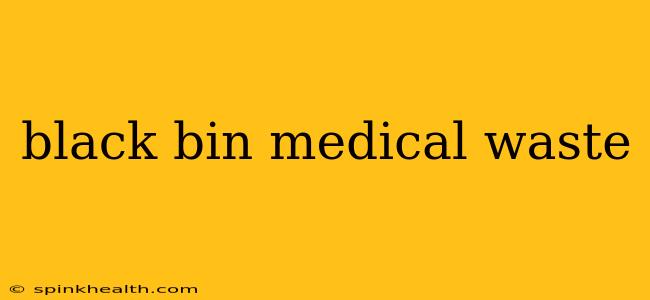The sight of a black bin overflowing with medical waste is unsettling, raising immediate concerns about safety and environmental impact. But what exactly constitutes black bin medical waste, and what are the critical steps involved in its safe disposal? This isn't just a question of following regulations; it's about protecting public health and the environment. Let's unravel the complexities surrounding this often-overlooked issue.
My name is Dr. Anya Sharma, and I've spent the last decade researching and advocating for safe medical waste management. This isn't just a job for me; it's a passion fueled by the belief that everyone deserves a safe and healthy environment.
What is Considered Black Bin Medical Waste?
This is often the first, and most crucial, question. The definition of "black bin medical waste" varies depending on local regulations, but generally, it refers to waste that is considered low-risk. This typically excludes items that are sharp, infectious, or highly toxic. Think of it this way: if it poses a minimal threat of infection or environmental harm, it might be acceptable for disposal in a standard black bin.
However, even within this low-risk category, care must be taken. Examples of waste that might be suitable for black bin disposal include:
- Used tissues and paper towels: These are typically contaminated with minimal amounts of bodily fluids. However, if heavily saturated with blood or other potentially infectious materials, they should be treated differently.
- Empty medicine containers (washed): Thoroughly rinsed and empty containers are generally acceptable, but always check local regulations. Never dispose of medication itself in the black bin.
- Bandages and dressings (dried and clean): Dried and visibly clean bandages are often suitable, but again, any materials soaked in blood or other fluids should be treated as clinical waste.
- Medical equipment that is no longer functional and has no sharp parts: Consider this a guideline and check individual council regulations.
Crucially, this is not an exhaustive list, and local regulations should always be followed. Improper disposal can lead to serious consequences.
What are the Risks Associated with Improper Black Bin Medical Waste Disposal?
Improper disposal of even low-risk medical waste can have significant consequences:
- Infection Control: While the risk is lower with "black bin" waste, improper disposal can still lead to the spread of infectious diseases. This is especially true if the waste contains even trace amounts of bodily fluids or contaminated materials.
- Environmental Contamination: Some medical waste, even if considered low-risk, may still contain chemicals that can pollute soil and water sources if not disposed of correctly.
- Accidental Injury: Sharp objects, even if small, can cause injuries if not properly contained before disposal.
How Can I Dispose of Medical Waste Safely?
This depends on the type of waste and your location. Always prioritize your local council's guidelines. They'll have specific regulations and procedures for disposing of medical waste. Usually, it would involve following their procedures for general household waste.
In short: Always err on the side of caution. If you're unsure whether something should go in the black bin, it's always best to contact your local waste management authority for guidance. Their website is typically the best source of up-to-date information.
What are the Regulations Regarding Black Bin Medical Waste Disposal?
Regulations vary significantly across regions and countries. Some regions have very specific guidelines for disposing of even seemingly innocuous medical waste. Checking your local council website is the single most important step you can take.
What Happens if I Dispose of Medical Waste Improperly?
Penalties for improper disposal of medical waste can vary, from warnings and fines to more severe legal action in cases of significant environmental harm or risk to public health.
Conclusion: Prioritize Safety and Compliance
Dealing with medical waste, even the "low-risk" kind, requires vigilance and adherence to local regulations. By taking the time to understand what constitutes black bin medical waste in your area and following proper disposal procedures, you contribute to a safer and healthier environment for everyone. Remember, when in doubt, contact your local waste management authority – it's always better to be safe than sorry.

